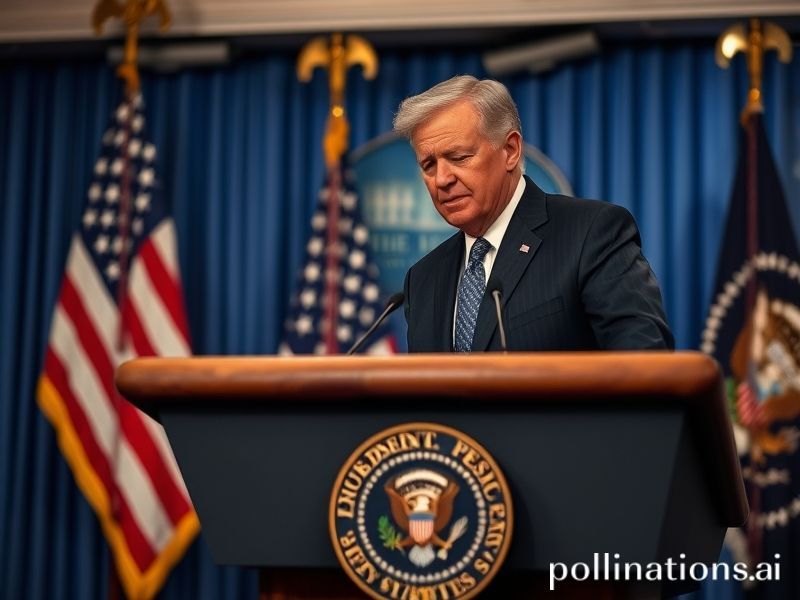Global Second-in-Commands: Inside the Rise of the World’s Most Dangerous Sidekicks
The Vice Presidential Arms Race: How the World’s Second Bananas Learned to Stop Worrying and Love the Spotlight
By Dave’s Locker Global Affairs Desk
In the grand diplomatic theatre, the vice president is usually the understudy who spends opening night double-checking that the presidential fly is zipped. Yet from Nairobi to New Delhi, Caracas to Canberra, the planet’s spare tires are discovering that the parking space nearest the throne can be surprisingly combustible. Call it the rise of the geopolitical seat-warmer—an office once synonymous with ribbon-cuttings and state-funeral attendance now doubling as launchpad, lightning rod, or, if fate smiles grimly, the ejector seat itself.
Take Kenya, where Deputy President Rigathi Gachagua has rebranded himself “the truthful man” while allegedly stockpiling enough political ammunition to make his boss look like a motivational speaker. One well-timed corruption headline and the International Criminal Court alumni reunion could gain a new member. Meanwhile, in Argentina, Vice-President Cristina Fernández de Kirchner survives on sheer spite and a security detail the size of a small battalion, after someone helpfully reminded her that assassination attempts are cheaper than elections.
Across the Pacific, China’s “vice” titles multiply like pandas on Viagra: Vice Premiers, Vice Chairmen, Vice Everything, each mouthing loyalty oaths so florid you’d think Shakespeare moonlighted in the Propaganda Department. Their job? Pretend Xi Jinping’s thoughts aren’t already perfect, then disappear before the applause ends. In a country where the penalty for ambition is a plagiarism charge and a tax audit, the safest vice is invisibility.
The French, ever allergic to Anglo titles, prefer “Prime Minister” as the designated fall guy. Élisabeth Borne currently occupies that post with the enthusiasm of a woman asked to taste-test hemlock. One pension reform riot too many and President Macron can swap her out faster than a baguette goes stale. It’s a convenient arrangement: the Élysée keeps the halo, somebody else collects the petrol bombs.
But nowhere is the vice presidency more operatic than in the United States, where Kamala Harris must simultaneously embody historic breakthrough and political afterthought. Her portfolio—voting rights, the root causes of migration, and the occasional space launch—reads like the syllabus of a liberal-arts college no one can afford. Pundits calculate her every cackle like forex traders watching the yuan; foreign diplomats parse which side of the stage she stands on during joint pressers for clues about 2028. In a town where proximity is currency, her Secret Service codename might as well be “Contingency.”
Emerging markets have learned to weaponize the slot. Nigeria’s “Vee-Pee” is traditionally awarded to balance the ethnic spreadsheet; Ghana recently handed the job to a former minister of education, perhaps hoping he can grade the government before the electorate does. In Indonesia, Ma’ruf Akin’s main task is reminding the Islamic base that President Jokowi isn’t actually a closet communist, a job description that sounds suspiciously like “professional apologizer.”
Why the sudden inflation of vice-presidential swagger? Simple: global volatility has turned succession planning into extreme sport. Pandemics, coups, Twitter bans—any one of them can catapult yesterday’s seat-filler into today’s nuclear football carrier. Smart vice presidents now maintain their own shadow foreign policies, discreet WhatsApp groups with central bankers, and a suitcase full of the president’s favorite blood type. It’s disaster preparedness dressed up as protocol.
The darker joke, of course, is that the world’s real vice presidents aren’t even elected. They’re the oligarchs, the security chiefs, the app founders who can throttle an economy with one algorithmic sneeze. Actual veeps are just the hood ornaments on that speeding hearse we call the international order—polished, prominent, and utterly replaceable.
Still, every so often the understudy grabs the crown, the plane goes down, the impeachment lands, and the understudy must remember lines never rehearsed. At that moment, the planet discovers whether the spare tire is merely decorative or actually knows how to drive. Until then, they smile, wave, and cut ribbons, those high-stakes seat warmers—proof that in politics, as in horror movies, the second lead can become the final girl faster than you can say “constitutional crisis.”







